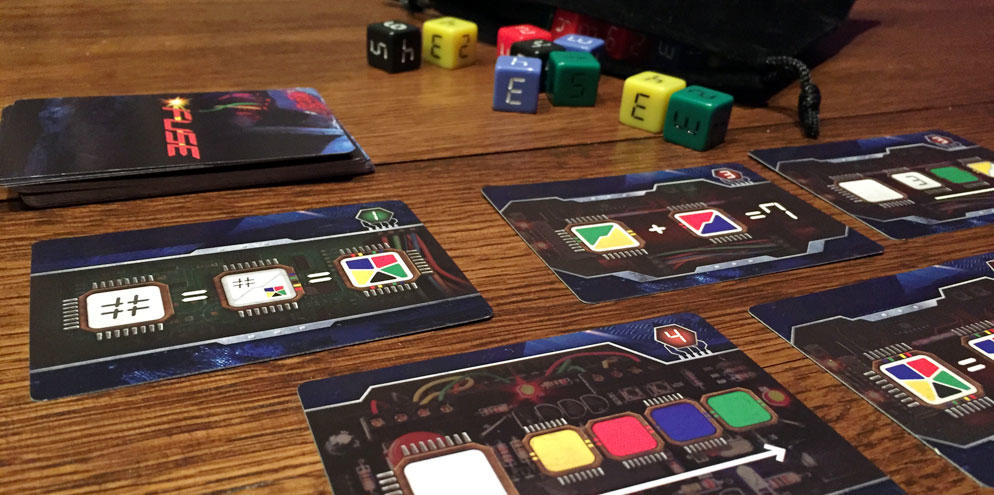
 Renegade Games is a new publisher that I’ve been keeping my eye on lately. They first caught my attention with their visually pleasing game Lanterns: The Harvest Festival (review here). It was a great little gateway game that has already made its way to our tabletop a few times.
Renegade Games is a new publisher that I’ve been keeping my eye on lately. They first caught my attention with their visually pleasing game Lanterns: The Harvest Festival (review here). It was a great little gateway game that has already made its way to our tabletop a few times.
Renegade Games has once again made an appearance on our tables with a real-time, cooperative dice rolling game called Fuse. In Fuse, players must work together to defuse a number of bombs that have been placed aboard their starship… and they have exactly 10 minutes to do this. Fuse promises fun, tense, game play were teamwork is a must. Did they deliver? Time to find out!
Fuse is a real-time, cooperative dice game for 1-5 players that takes exactly 10 minutes to play. In our experience, Fuse plays well with any number of players.
Game Overview:
Players will have exactly 10 minutes to defuse 20+ bombs on their ship. Each bomb is represented by a card that needs a specific combination of dice in order to defuse it. Rounds being with the players drawing a number of dice from the bag equal to the amount of players. The players must then decide, as a group, who gets which die. But they have to be quick about it as the timer is always counting down. If they can get through all the bomb cards before the timer ticks to 0, they will emerge victorious.
Game Components:
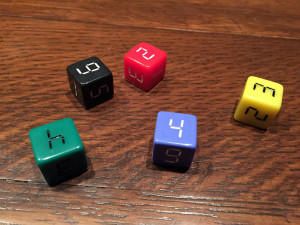
While Fuse’s components are mostly minimal, what does come in the box is well crafted. The game comes with 25 custom dice in five different colors. The dice are custom in font only, as they are standard 6 sided dice.
The other main component of Fuse are the 54 bomb and 11 Fuse cards. These are illustrated to depict which dice are required to disarm the bombs. Most cards are fairly easy to understand but we did encounter a few that were a tad confusing and had us reaching for the rulebook.
The other thing of note is the game’s timer. Fuse uses a smartphone app for the timer, free to download from the app store or google play. The timer works as expected, with the added bonus of a vocal countdown and sound effects. The voice over has two options, standard and… wacky, for lack of a better term. I’ll let you experience that one yourself.
How to Play:
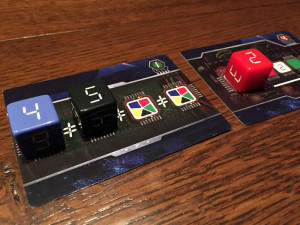
To begin the game, the deck is shuffled with a number of bomb cards depending on the player count and difficulty level. This means you will be disarming anywhere from 18 bombs up to 30+ on the hardest setting.
6 fuse cards are also added to the deck, which are basically setback cards.
Each player starts the game with 2 bomb cards in front of them. There will also be 5 bomb cards face up in the center of the table.
When the players are ready, the timer is started and the game beings.
The first player draws dice (equal to the player count) from the bag and rolls them. Players must decide who gets which die, as each player must take exactly 1 die.
Dice are placed on a player’s bomb card according to its requirements. These range from a specific number, to a specific color, to a relationship between other dice on the card (equal to, higher, lower, or adding up to a certain value).
Once a card has been completed with all required dice, it’s discard and the player draws a new card from the center of the table (replacing it with one from the draw pile).
If a player can’t use one of the dice rolled, then they must roll that dice again and every player must lose a matching color or number on one of their bomb cards if they have one.
If a fuse card is drawn, every player must discard a matching color/number die from one of their bombs.
If the timer runs out and there are still bombs left to defuse, the players lose in a fiery explosion. If the players manage to disarm enough bombs so that there are no cards left in the draw deck or the center of the table, they win! Any face-up bomb cards left in front of the players turn out to be duds.
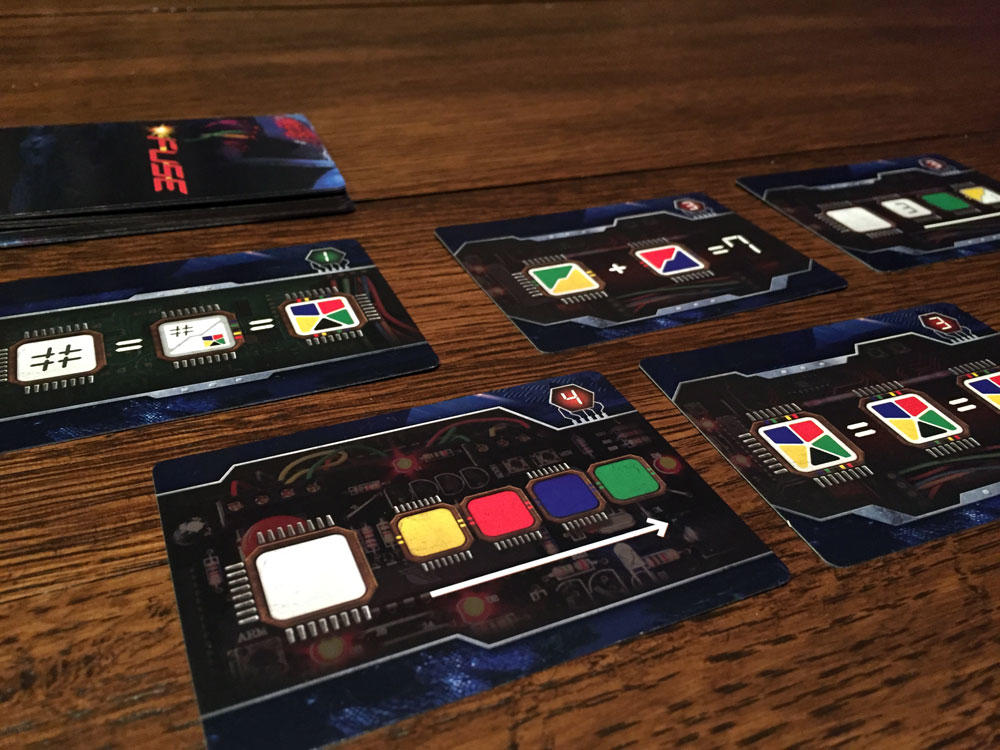
Game Experience:
In general, I’m a pretty big fan of real-time games. I play with a lot of gamers who can get easily distracted and these kind of games help keep players laser focused. No twiddling with your iPhone while playing Fuse, as there is zero downtime.
That being said, I also have friends who are pretty deep with analysis paralysis and playing real-time games with them sometimes makes me want to toss them out a window: “We’re on the clock, make a decision!”
So if you are planning on investing in any real-time game, you definitely need to be aware of the type of people you usually play with. This is doubly true with Fuse, as it’s both cooperative and real-time. The game’s difficulty level, combined with the nature of its mechanics, demand a good amount of teamwork if you hope to win.
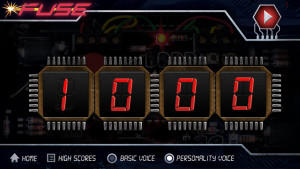
The teamwork aspect is actually one of my favorite parts about playing Fuse. I like figuring out the best approach to take each round, even if I only have seconds to do it. However, If you get even one selfish player, it can really sink the whole team. Rolling those setback dice can be quite painful. But when you get a team that knows both how to play well and work together, it can be a thing of beauty.
Fuse’s real time nature also helps to eliminate the quarterbacking issue prevalent in so many cooperative games. You really don’t have the time for an alpha player to take charge of the game. Most of the time I found myself just able to concentrate on my cards. I can’t imagine a player trying to control the game by working other players cards as well, there is just too much going on and not enough time.
I’ve also tried Fuse with just about every player count and I can safely say that the game scales quite well. The game is just as difficult with 2 players as it was with 5. The high player counts can definitely get a bit more chaotic as there are more hands reaching for dice, but I kind of enjoyed that. It seemed to fit the game really well.
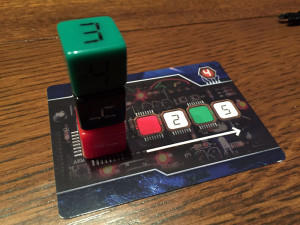
As with most cooperative games, Fuse can be a hard game to win. We tended to lose this one more than we won. A few of our losses were REALLY close, like 1-2 bombs left. It’s those times when the losses hurt even more. However the more experience we got under our belts, both in knowing which dice to place and also working as a team, the more the victories came.
One thing that I think could have been done better is the way the deck is built. Right now, you just deal out a random selection of cards. In our case, a little less than a 3rd of the deck. Cards have different difficulty ratings on them (from 1-4), so what this means is that it’s a definite possibility to have a deck stacked with more hard cards than easy (or vise versa). I would have preferred a deck building rule where you shuffle in a specific amount of cards from each difficulty level. In a game so filled with chance, that would have been an easy bit of randomness to eliminate. But maybe I’m over thinking this one. In either case, this is something that can be easily house ruled with minimal effort.
Finally, I want to say that overall, Fuse does a really good job of providing a tense and exciting game experience. While the game is only played over 10 minutes, those are a quick ten minutes. The game seems to fly by and I guarantee that you’ll rarely feel like you have enough time.
Final Thoughts:

I liked fuse. The rules were simple, the gameplay highly accessible, and the challenge was spot on. While Fuse isn’t the type of game that’s going to spend hours straight on your gaming table, I think it does fill its role as a filler game quite nicely. This is especially true due to its 10 minute timer, which makes it the perfect game to bring out while you are waiting for others to show up for a night of gaming.
While Fuse provides a good amount of entertainment, the difficulty and chaotic nature of the game may still be a turn off for some. This is especially true for those that like more strategic games where they can plot their moves from turn to turn.
For everyone else though, Fuse makes a good addition to your game library and should make its way to the table often. I’ve played my copy with both my gamer friends and also my non-gaming family and everyone has enjoyed themselves. Fuse is a game where when you win, there will be an audible cheer and when you lose, players will immediately begin to unpack where they think they went wrong.
So if you are looking for an accessible, quick playing game that’s overflowing with tension, Fuse delivers.
If you’d like to pick up a copy of Fuse, you can get it for $25.
Final Score: 4 Stars – A great little filler game that will give you some tension filled moments and a pretty decent challenge.
 Hits:
Hits:
• Easy to learn rules
• Quick game play
• Lots of tension
• Cooperation is a must
Misses:
• Some cards are a little hard to decipher
• The deck randomness could have been managed better






















This is easily my favorite game of 2015. I think it hits all the notes that Escape! failed to hit for me and my group. Plus, the solo game is EXCELLENT. It’s actually a solo game worth playing.
I saw this game and was considering it, as I usually do one player games. Do you know where I can find video or rules on how the solo game works? Seems like most of the stuff I’m finding online doesn’t cover that. Thanks in advance!
Not a video, but you can download a PDF of the rules here: http://www.renegadegamestudios.com/fuse/
That should tell you how the solo game works.